Related Research Articles
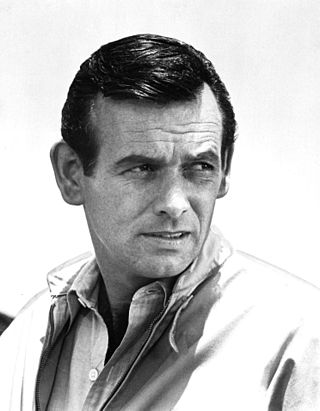
David Janssen was an American film and television actor who is best known for his starring role as Richard Kimble in the television series The Fugitive (1963–1967). Janssen also had the title roles in three other series: Richard Diamond, Private Detective; O'Hara, U.S. Treasury; and Harry O.

Highway Patrol is a 156-episode action crime drama series produced for syndication from 1955 to 1959. It was "one of the most popular syndicated series in television history", and it was the first American series broadcast in West Germany on that country's commercial TV channel.
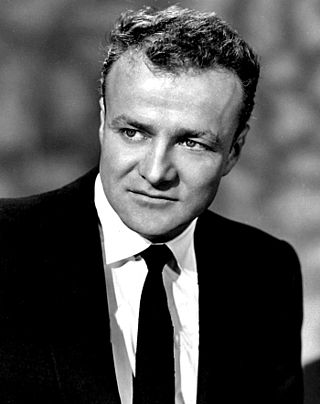
Robert Alba Keith, known professionally as Brian Keith, was an American film, television, and stage actor who in his six-decade career gained recognition for his work in films such as the Disney family film The Parent Trap (1961); Johnny Shiloh (1963); the comedy The Russians Are Coming, the Russians Are Coming (1966); and the adventure saga The Wind and the Lion (1975), in which he portrayed President Theodore Roosevelt.

Big Town is a popular long-running radio drama featuring a corruption-fighting newspaper editor initially played from 1937 to 1942 by Edward G. Robinson in his first radio role, with echoes of the conscience-stricken tabloid editor he had played in the film Five Star Final. Edward Pawley played the lead role longer, 1943–52, in plots that made the editor more of a hands-on crime-fighter. During the later Pawley years, Big Town was adapted to film and television series, and a comic book published by DC Comics.

The Lawrence Welk Show is an American televised musical variety show hosted by big band leader Lawrence Welk. The series aired locally in Los Angeles for four years, from 1951 to 1955, then nationally for another 16 years on ABC from 1955 to 1971, followed by 11 years in first-run syndication from 1971 to 1982. Repeat episodes are broadcast in the United States by PBS stations. These airings incorporate an original program — usually, a color broadcast from 1965 to 1982 — in its entirety. In place of the commercials, newer performance and interview clips from the original stars and/or a family member of the performers are included; these clips are occasionally updated.
Ozark Jubilee is a 1950s American television program that featured country music's top stars of the day. It was produced in Springfield, Missouri. The weekly live stage show premiered on ABC-TV on January 22, 1955, was renamed Country Music Jubilee on July 6, 1957, and was finally named Jubilee USA on August 2, 1958. Originating "from the heart of the Ozarks", the Saturday night variety series helped popularize country music in America's cities and suburbs, drawing more than nine million viewers. The ABC Radio version was heard by millions more starting in August 1954.

Edward Albert Heimberger was an American actor. He is known for his roles on stage and screen and received nominations for two Academy Awards, a BAFTA Award, and two Golden Globe Awards.

Julie London was an American singer and actress whose career spanned more than 40 years. A torch singer noted for her contralto voice, London recorded over thirty albums of pop and jazz standards between 1955 and 1969. Her recording of "Cry Me a River", a song she introduced on her debut album Julie Is Her Name, was inducted into the Grammy Hall of Fame in 2001. In addition to her musical notice, London was nominated for a Golden Globe Award in 1974 for her portrayal of Nurse Dixie McCall in the television series Emergency!

William Gerald Paris was an American actor and director best known for playing Jerry Helper, the dentist and next-door neighbor of Rob and Laura Petrie, on The Dick Van Dyke Show, and for directing the majority of the episodes of the sitcom Happy Days.

Four Star Playhouse is an American anthology series that ran from September 25, 1952, through September 27, 1956.
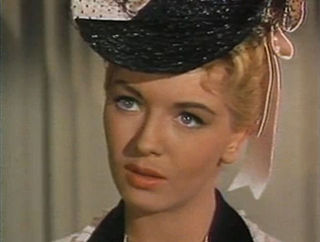
Merry Anders was an American actress who appeared in a number of television programs and films from the 1950s until her retirement from the screen in 1972.
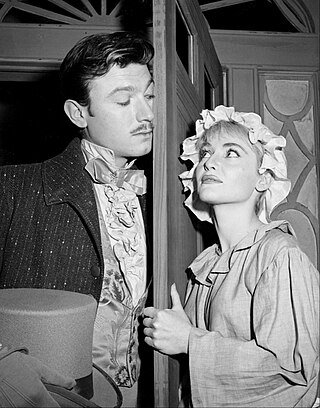
The Alcoa Hour is an American anthology television series sponsored by the Alcoa Corporation that aired live on NBC from October 16, 1955, to September 22, 1957.
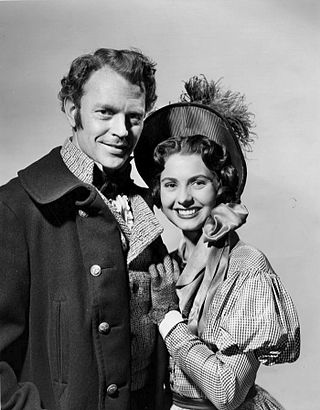
Schlitz Playhouse of Stars is an anthology series that was telecast from 1951 until 1959 on CBS. Offering both comedies and drama, the series was sponsored by the Joseph Schlitz Brewing Company. The title was shortened to Schlitz Playhouse beginning with the fall 1957 season.

The Paramount Television Network, Inc. was a venture by American film corporation Paramount Pictures to organize a television network in the late 1940s. The company-built television stations KTLA in Los Angeles and WBKB in Chicago; it also invested $400,000 in the DuMont Television Network, which operated stations WABD in New York City, WTTG in Washington, D.C., and WDTV in Pittsburgh. Escalating disputes between Paramount and DuMont concerning breaches of contract, company control, and network competition erupted regularly between 1940 and 1956, culminating in the DuMont Network's dismantling. Television historian Timothy White called the clash between the two companies "one of the most unfortunate and dramatic episodes in the early history of the television industry."

Crossroads is an American television anthology series based on the activities of clergy from different denominations. It aired from October 7, 1955, to September 27, 1957, on ABC. The show was retitled The Way of Life for syndication.
"Original Song" is the sixteenth episode of the second season of the American television series Glee, and the thirty-eighth episode overall. It was written by Ryan Murphy, directed by Bradley Buecker, and premiered on Fox in the United States on March 15, 2011. McKinley High's glee club, New Directions, decides to prepare original songs for the Regionals competition against the Dalton Academy Warblers, and Westvale High's Aural Intensity coached by Sue Sylvester. Blaine finally shows his affection for Kurt. Rachel tries to repair her relationship with Finn and faces off with Quinn. New Directions wins the Midwest Regional Show Choir competition, advancing to the upcoming Nationals competition in New York City.
Frederic W. Ziv Company produced syndicated radio and television programs in the United States. Horace Newcomb's Encyclopedia of Television described the company as "by 1948 ... the largest packager and syndicator of radio programs" and later "the most prolific producer of programming for the first-run syndication market during the 1950s."

Andor, also known as Star Wars: Andor, is an American science fiction television series created by Tony Gilroy for the streaming service Disney+. It is part of the Star Wars franchise and a prequel to the film Rogue One (2016), which in turn is a prequel to the original Star Wars film (1977). The series follows thief-turned-rebel spy Cassian Andor during the five years that lead to the events of the two films, exploring how he becomes radicalized against the Galactic Empire and how the wider Rebel Alliance is formed.

It's Always Jan is an American sitcom that aired on CBS during the 1955–56 television season. The series stars Janis Paige as a widowed nightclub singer struggling to make ends meet.
This Is Show Business is an American variety television program that was broadcast first on CBS and later on NBC beginning July 15, 1949, and ending September 11, 1956. It was CBS-TV's first regular series broadcast live from coast to coast. It was originally titled This Is Broadway.
References
- 1 2 Brooks, Tim; Marsh, Earle F. (June 24, 2009). The Complete Directory to Prime Time Network and Cable TV Shows, 1946-Present. Random House Publishing Group. p. 305. ISBN 978-0-307-48320-1 . Retrieved March 23, 2024.
- ↑ "Exciting Lines for 'Crusader' Provided by Numerous Groups". The Times-Tribune. Pennsylvania, Scranton. January 14, 1956. p. 30. Retrieved March 24, 2024– via Newspapers.com.
- ↑ Adams, Val (May 29, 1955). "Radio-TV News: 'Morning Show' Overhaul" . The New York Times. p. 59. Retrieved March 23, 2024.
- 1 2 "Net Reissues, Regional Deal, 3 Local Series Boost Mart". Billboard. November 3, 1956. p. 9. Retrieved March 23, 2024.
- ↑ "'Crusaders' in Production For Fall Bow". Billboard. March 12, 1955. p. 6. Retrieved March 24, 2024.